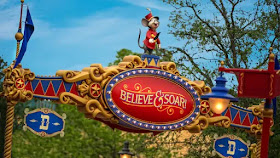One of the most popular rides in Disney World's Magic Kingdom is "Dumbo the Flying Elephant;" so popular, in fact, that Disney recently doubled capacity by moving the ride out of Fantasyland into it's own Storybook Circus area, complete with a Big Top play area for children waiting in line to ride.
Over the entrance to the ride area you will see Dumbo's friend and mentor, Timothy Q. Mouse, holding a feather. Those who are familiar with the 1941 Disney classic film will know the feather's significance. Dumbo is born with unusually large ears and relatively small body (for an elephant), which causes others to ridicule him, but which gives him enough surface-area-to-weight ratio to fly (OK, the math is a little fuzzy). The problem is, Dumbo doesn't believe in his own ability, and is too afraid to try. Timothy comes up with a solution: He finds a random feather and convinces the petulant pachyderm that the feather is magic. His confidence restored, Dumbo takes flight—until the crisis moment when he loses hold of the feather. Dumbo nearly plummets to his death before Timothy convinces him to unfurl his ears and believe in himself once again.
Dumbo's feather is an iconic symbol for the humanistic version of faith: A mystical bit of fairy dust that empowers you to believe in yourself. In our disenchanted age of materialistic naturalism, this is the only form of "magic" many can believe in or tolerate. "Strictly speaking it's not necessary, but if it makes you feel better about yourself, go for it" is the mentality.
There's nothing wrong with developing one's self-confidence as far as that goes. However, there is something badly wrong when Christians substitute feather-faith for the real deal. Biblical faith is precisely not 'believing in yourself'; it is looking to the faithfulness of Jesus, the one who was raised from the dead. "Let us run with endurance the race God has set before us. We do this by keeping our eyes on Jesus, the champion who initiates and perfects our faith. Because of the joy awaiting him, he endured the cross, disregarding its shame. Now he is seated in the place of honor beside God’s throne." (Heb. 12:1-2)
This does not mean that we sit on the ground (to continue the analogy) and say, "I cannot fly, but I trust in Jesus to fly for me." Rather, the goal is to recognize that in Jesus, I can fly, just as Timothy Mouse can fly when he is sitting inside Dumbo's cap. To put it literally, the Christian life is not saying "I will always be a sinner but I trust Jesus to be righteous for me." Rather it is believing "On my own I cannot overcome sin, but in Christ, I have the power to live in victory over sin and be filled with the love of God."
This is the great secret of life in Christ. "My old self has been crucified with Christ. It is no longer I who live, but Christ lives in me. So I live in this earthly body by trusting in the Son of God, who loved me and gave himself for me." (Gal. 2:20) To be "in Christ" means being united with him both in his death and in his resurrection: "Since we have died to sin, how can we continue to live in it? Or have you forgotten that when we were joined with Christ Jesus in baptism, we joined him in his death? For we died and were buried with Christ by baptism. And just as Christ was raised from the dead by the glorious power of the Father, now we also may live new lives." (Rom. 6:2-4)
In fact, every rider who gets on Dumbo the Flying Elephant experiences this in a way: by staying seated inside the "elephant," we are able to fly through the skies over Disney World. We do this not by believing in ourselves, but by trusting in the ride—trusting enough to get inside and go where it goes. "For those who are led by the Spirit of God are the children of God." (Rom. 8:14)
So the next time you ride Dumbo, take it as a reminder: Let go of your feather-faith. Take hold instead of the faithfulness of Christ.




No comments:
Post a Comment